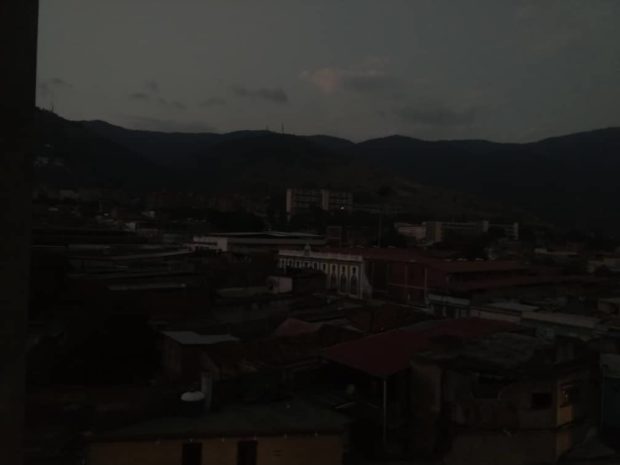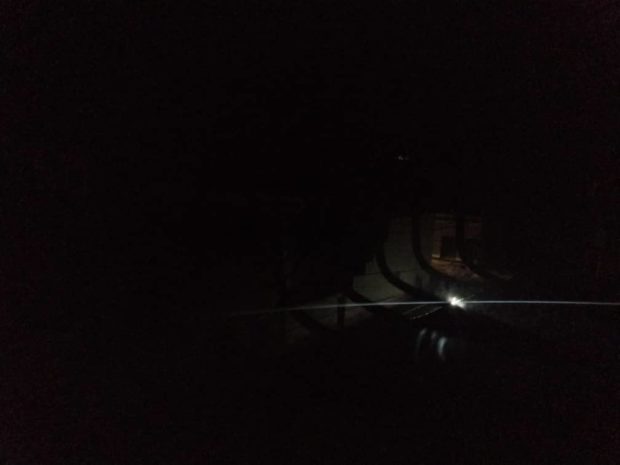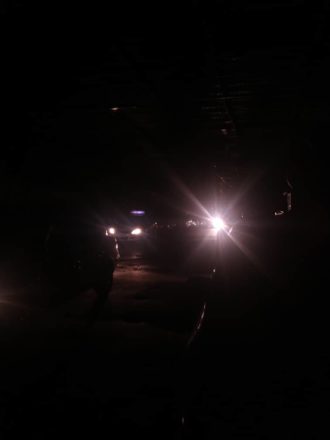“Driving was almost like going out with my eyes closed”. That was the first thing Mayra Pérez, a Venezuelan teacher, thought when she took her car and drove to the elementary school where she works, located in western Caracas. By then, barely 14 hours had passed since the worst blackout in the history of Venezuela started.
At 4:55 pm on Thursday, March 7, a failure in the national electrical system affected the vast majority of the country, at least 20 states. The authorities of Nicolas Maduro’s government promised to restore the service by that night, but what seemed to be just another blackout ended up becoming the worst nightmare that Venezuelans have experienced since the electricity crisis began.
In the “untouchable” Caracas, the city protected by the government from shortages, the blackout extended for over 50 hours with brief intermittent lapses of power in some areas of the capital. In the rest of the country, which has suffered severe electrical rationing for years, the service was restored sometime later, also irregularly.
On Friday, March 8, Mayra arrived early at the elementary school to welcome the few children who had gone to class with the expectation that the electric power would be restored. In one of the classrooms, she managed to charge her cell phone with a small generator from the institute. As soon as she saw she had enough battery, Mayra returned home. That day classes were canceled due to the lack of electricity.
More than 7,400 kilometers away from Caracas, in Uruguay, Omaira Mendes was desperate to contact her mother. Mayra’s daughter swells the numbers of the Venezuelan diaspora that has sought refuge outside the borders to escape the economic and political crisis. Omaira is one of the 3.4 million migrants who, according to the United Nations High Commissioner for Refugees, have left the country in recent years.
“I contacted my mom almost 24 hours after the blackout began. She turned off her cell phone to save the battery, but she did not have a phone signal either. When I finally got to talk to my mother, I started reading her the news about Venezuela that appeared on my Twitter feed. For her, the uncertainty of not knowing what was going on was worse than not having electricity, “said Omaira from Montevideo, Uruguay.
During the blackout, Caracas was transformed into a city where time seemed to stop. The resources that had once sprung up in the country in spurts and which the government had subsidized, now seemed more finite than ever. They had become a luxury for the population.
There was no light and, therefore, neither water nor gas. The telephone lines did not work and card transactions collapsed. Buying food or preserving the few foods left at home was a headache.
Hotels and restaurants in Caracas with power generators were crowded. The most privileged turned to five-star rooms to escape from chaos for a few hours, paying good money just to get power, regular water and Wi-Fi. Places with rooms valued at about $150 a night, or more, were already fully booked.

In the Renaissance hotel bar, located in a high-class neighborhood in Caracas, people had Wi-Fi and outlets to charge cell phones just by ordering a drink. Dozens of young people went there to work, get a phone signal and read the news from their devices.
Even media outlets had to improvise newsrooms at hotels in order to report the news.
The most important highways and avenues of the capital were filled with cars, but not because of traffic. Drivers parked in the middle of the road to find very weak phone signals and to be able to communicate with relatives in other states or outside the country.
Without the possibility of doing any card transactions, and without enough bolivars (the Venezuelan currency) in cash because of the hyperinflation and inoperative banks, the dollar became the official currency during the blackout.
In pharmacies, bakeries, restaurants and supermarkets people forgot about the recent “monetary reconversion” and welcomed transactions with bills of one, five, ten and twenty dollars. Along with food, the most requested products were candles, drinking water and ice to momentarily get through the emergency caused by the blackout.
“When we arrived in Caracas on Sunday (third day of the blackout), my sister was afraid that the food we had in the fridge would get rotten. We went to the supermarket and it was impossible to pay with cards. Sellers charged three dollars for a bag of ice cubes to keep food frozen at home”, said Gherzon Casanova.
Gherzon is a young Venezuelan doctor currently based in Spain. He was in the western state of Mérida visiting his family when the blackout occurred.
At first, he thought the lack of electricity was due to the power rationing the rest of the states of Venezuela are accustomed to. When he found out that the system’s collapse was national, he knew that the situation was serious.
“We did not imagine the magnitude or the size of what we were living by then. At the beginning of March, there was a blackout in Mérida that lasted 12 hours. Days later, every 48 hours, there were shorter power outages. On Friday 12, when we saw that it dawned and there was no electricity, we started to get worried”, said Gherzon, who had not visited Venezuela for more than a year.
In the middle of the blackout, even getting gasoline was hell in the country with the largest proven oil reserves in the world.
“It took me two days to fill my tank”, said Carlos Egana, a young writer and student leader who lives in a privileged suburb of Caracas. “I remember being in a line at a gas station for 20 minutes waiting my turn. The workers were no longer stocking because the power was gone. We did not know. There were dozens of cars waiting for nothing”.
As a millennial, he confesses it was harder for him to get used to the lack of phone signal than to the lack of power. “It feels like living in North Korea or Cuba”, he said.
“As Venezuelans, we are used to having power outages very frequently. We saw a collapse like this coming. However, in previous blackouts, we could at least count on having a phone signal to reach other people. The uncertainty, not knowing what is happening, is something that collapses you emotionally and psychologically. It affects you on a very intimate level”, said Egana.

Three patients were in the operating rooms of Jose Manuel de los Rios hospital when the lights went out completely. The pediatrician Vietnan Vera thought that it was another blackout, like the many others he has lived through in the hospital located in Caracas. But he was wrong.
The main pediatric hospital in Venezuela did not have what it needed to operate properly in the middle of the blackout. “The hospital’s internal power plants did not work. We were in absolute darkness. Thank God we only had four patients connected to mechanical ventilation”, he said.
Illuminated with the lights of the cell phones, the nurses ran around the floors of the hospitalization tower asking for an oxygen mask to give manual ventilation to patients with respiratory deficiencies. Some children cried in terror of being wrapped in darkness for so many hours.
The state’s National Electric Corporation (Corpoelec) moved two portable power plants to the children’s hospital, but neither one worked. It was the third one that finally could provide energy in critical areas of the pediatric center to keep patients who required artificial respiration connected.
The rest of the hospital remained without power until Sunday night, March 10.
From January 2019 until the day of the blackout, the Committee of Users Affected by Power Outage, a group that monitors the behavior of the national electricity system, accounted for more than 3,400 electrical faults throughout the country, which includes total and partial blackouts.

As in previous occasions, the government of Nicolás Maduro attributed the national blackout to sabotage, this time to a cybernetic and electromagnetic attack. He offered his first statement when the country had spent 48 hours without electric power. However, energy specialists have warned since the mandate of Hugo Chavez (1998-2013) about the lack of maintenance in the energetic field.
Two days later, on March 12, Maduro announced the creation of a commission composed of members of his cabinets to investigate the alleged attack. The team, he added, will have the support of the governments of Russia, Iran, Cuba and China, Venezuela’s main geopolitical allies.
That same day, the Minister of Communication and Information, Jorge Rodríguez, informed the public that the electric service had already been restored in “almost the entire country”, even though various sectors did not have regular power.
However, hours later, Maduro called on the population to prepare with candles, flashlights, water tanks and battery-powered radios in the face of new alleged sabotage attacks to the electrical system.
Meanwhile, life in Caracas and the rest of the country remains lethargic. The electric problem was solved momentarily, but Venezuelans are still searching for what the light took: gas, water, food, cash and normality.










